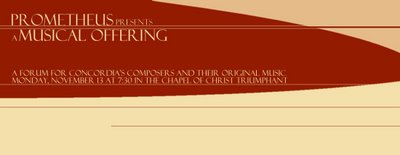I walked towards the library the other month, to reinforce my scant set of sources for senior seminar. It was the second time. Last time I had come alone, got lost, almost got hit by someone, and finally stole a resident’s parallel spot as soon as he left. This time, it was snowing.
I tried to tell a friend how I feel about libraries. Most people wouldn’t understand, I think, about the size, the number, the absolute availability of information. I think people these days are similarly impressed with the Internet. But I don’t get the same thrill of research when I google something. In fact, I get this cheesy feeling that I’ve been cheating. In a library, books are solid, hardcover, permanent. They’re certainly more “real” to my hands than an Internet source.
I was thinking about this as the UWM library loomed over me. Each floor stood stacked upon another like a lazy pile of videotapes, corner extending over corner, rows of windows revealing ceiling-high stacks filled with books. At the top floor, through those windows, on my right hand side, lay my PS.3505.U334 books. I recalled The Name of The Rose, a murder mystery set in a Franciscan Abbey in 1327 AD. Their library was held in the upper floor of the Aedificium, which is a large building for study, with the kitchen in the lower floor.
The second floor had held the Scriptorium. I looked from where I crossed the street to the second floor of Golda Meir, and saw at tables people writing and reading, just like careful monks, with cold fingers illuminating their beautiful transcriptions. All day long, between their offices, Franciscans filled their texts with gold ink, depicting fantastic kingdoms, terrible monsters, humans with animal heads and claws, musical instruments played by beasts. I remembered the debate of the monks about tragedy and seriousness versus comedy and frivolity that had taken place in the Scriptorium. One monk, the old blind one named Jorge, had associated laughter with the devil, condemning it with comedy.
I pushed open the doors of the west wing. A rather tired-looking man sat at the first desk, there, like a little king. His job was to glance at me, give silent approval of my entrance, and turn away. I found the stairs on the left, and hauled my materials up the steps to floor 3. In the Aedificium, Abbey newcomers William of Baskerville and his young accomplice Adso of Melk had to sneak into the library. It was restricted from all monks. Even the Abbot avoided the Library. Only the librarians knew the codes; only the librarians passed that knowledge to their successors. Theirs was a profession of secrecy.
Of course, the book was a murder mystery, and since it was by Umberto Eco, in a 1327 monastery boasting the largest library in Italy, how could the mystery of seven deaths not be centered on the library, at least according to William? William and Adso had to sneak into the Aedificium late at night, through a passage deep below a graveyard of buried monks, from the chapel to the kitchen. The doors from the Scriptorium and the library were left unlocked on the principle that no one knew of the secret passage (except the librarian, the Abbot, and now Adso and William).
The library in the Aedificium was a labyrinth.
I picked up several books from PS.3505: (re)Valuing Cummings, Critical Essays, etc. I decided to take a leaf out of Dr. Krenz’s (and Wayne Booth’s) book, and look into the bibliographic pages for more books. Of course the library is a labyrinth, for here in these pages are 135 more sources about my subject, which I never knew existed. The library was interconnected, woven, cross-referenced. And I was pulling a string out a pocket that would never end.
The end of that string for William and Adso had been near, through poisonous, hallucinogenic smoke, a maze of rooms with blind walls, no windows, carnival mirrors, narrow slits to transform wind into ghastly howling. The Finis Africae was the final room they sought. It contained a book that would solve every mystery, and reveal a whole world of delight to a researching population. I suppose I was seeking my own Finis Africae. To me it was the book that would do what I was doing in research. It was the book that could even abort my precious research by leaving me with the short end of the stick: has my paper “already been done?”
Of course, for Adso and William, their book was not so docile. At its fault, disaster occurs, men go mad, they die, a world collapses, and it’s all thanks to a passionately kept secret: the library’s true contents. I wonder what UWM had kept beneath these stacks, between the walls, over the ceilings—probably dry wall, bricks, mortar, or wood, or electronics. There is no room for secrets anymore. It’s all on the Internet.
I had been reading and doing note cards for 2 hours, now. My hands wanted a bit of warmth. I leaned from my desk and looked beyond the cards and the books to the soft city lights, and tried to picture Italian mountains, other monks. Vespers was about to ring, and soon we would reawaken at 2:00 for the first office of the day. The snow still blew beyond the third-story window, and below, a city gleamed with mystery. The sidewalks lay quietly, silenced by a descending layer of snow.
(Caleb Sattler)



